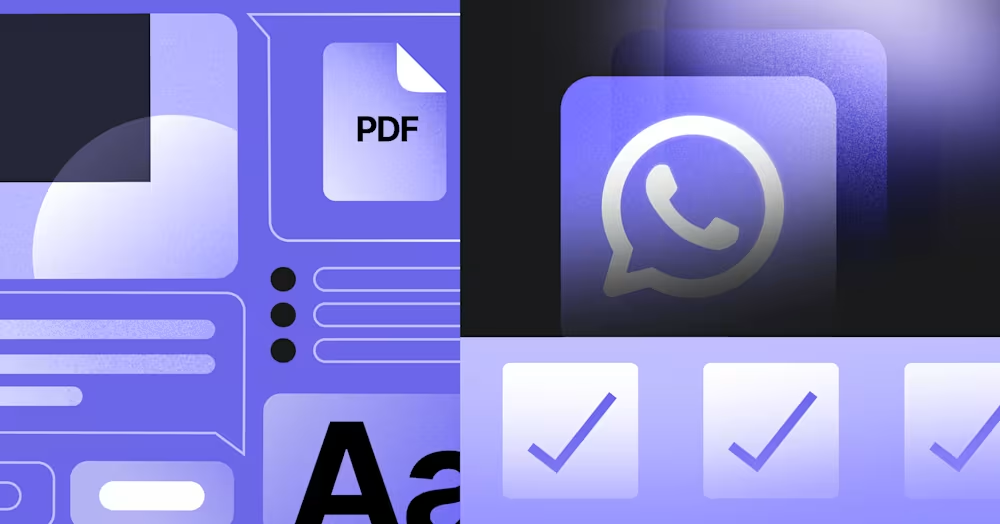
WhatsApp Message Template: A How-to Guide with 13 Examples
Businesses can't send WhatsApp messages after 24 hours unless they use WhatsApp Message Template. Learn how to format and send template messages plus examples.

Are you messaging customers on WhatsApp API but need better customer engagement or conversion rates? Then you should consider using WhatsApp Business Calling API. In this blog, we’ll go through what it is, its benefits, how it works and the use cases of WhatsApp Business Calling API.
WhatsApp API Call, also known as WhatsApp Business Calling API, is a new feature of the WhatsApp API that allows businesses to make and receive voice calls through WhatsApp. Unlike standard WhatsApp calls, WhatsApp API Call has been designed for businesses expecting a large volume of calls with a stable connection. But why should businesses consider calling customers over WhatsApp?
WhatsApp API Call offers a ton of benefits to businesses. It combines the familiarity of WhatsApp with the immediacy of voice communication. It offers a versatile way to address customer needs.
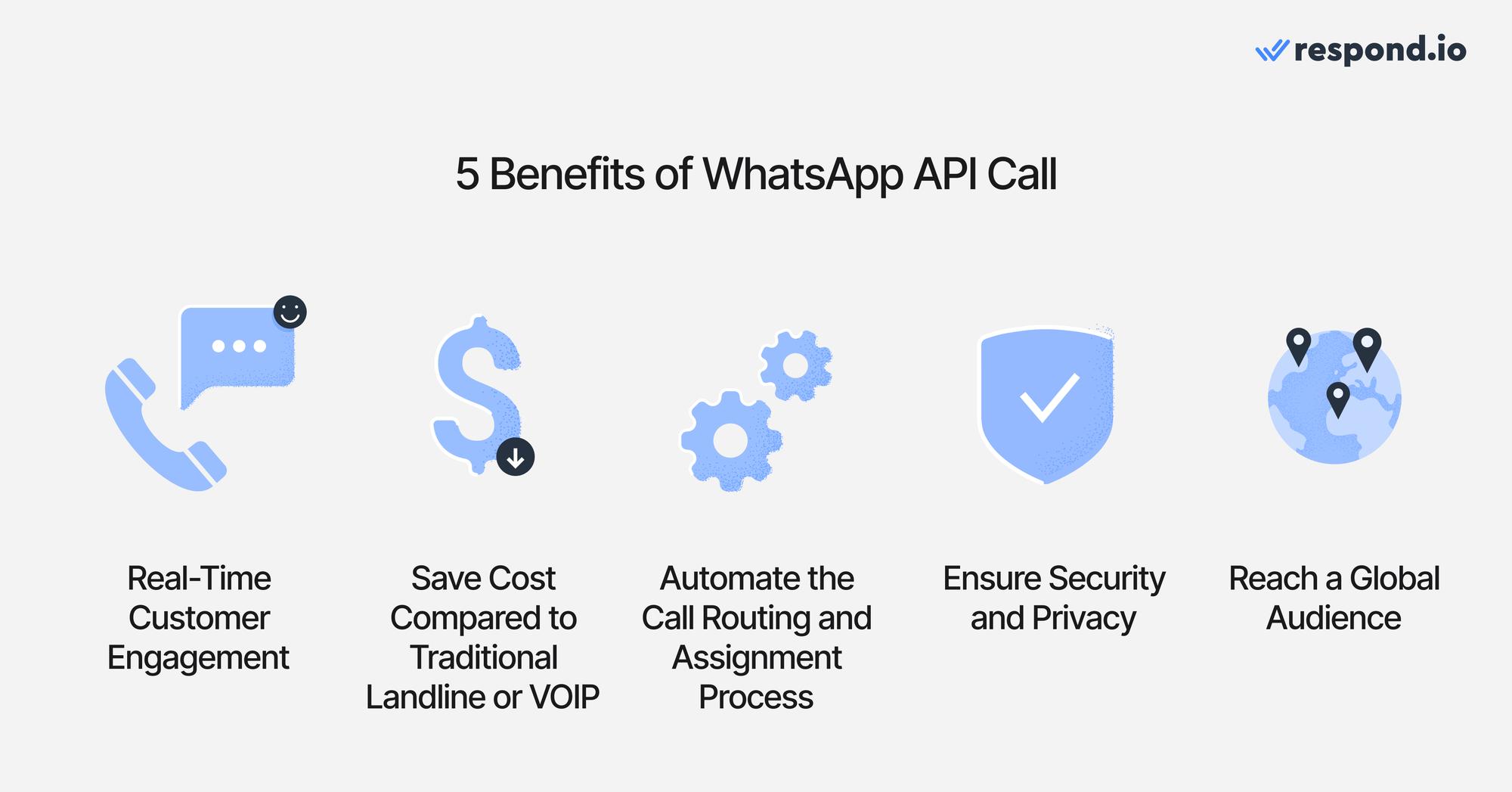
Whether it’s resolving concerns, guiding purchases, or enhancing support, WhatsApp API Calls help bridge the gap between convenience and connection. Let’s take a look at these benefits of WhatsApp API Calls.
Let customers call from WhatsApp—the app they already trust—while your team answers from respond.io.
Without extra tools, training or context switching needed, it’s just a natural extension of the conversation.
Customer-initiated calls are 100% free for your business—no per-minute fees or call charges. Save budget while staying reachable to more customers.
Customers can call you with one tap, straight from the chat. No app switching, no copy-pasting numbers — your team picks up the call in the same interface they message from.
Available wherever WhatsApp works—no setup delays or telco restrictions. Customers worldwide can reach you instantly, for free, making it perfect for global brands and distributed teams.
Now that you know the benefits of WhatsApp API Calls, let’s look at how they work.
Turn conversations into customers with respond.io's official WhatsApp API ✨
Manage WhatsApp calls and chats in one place!
Unlike traditional landlines or VOIP, businesses aren’t allowed to make calls to contacts whenever they want. This is to ensure the privacy of contacts is respected.
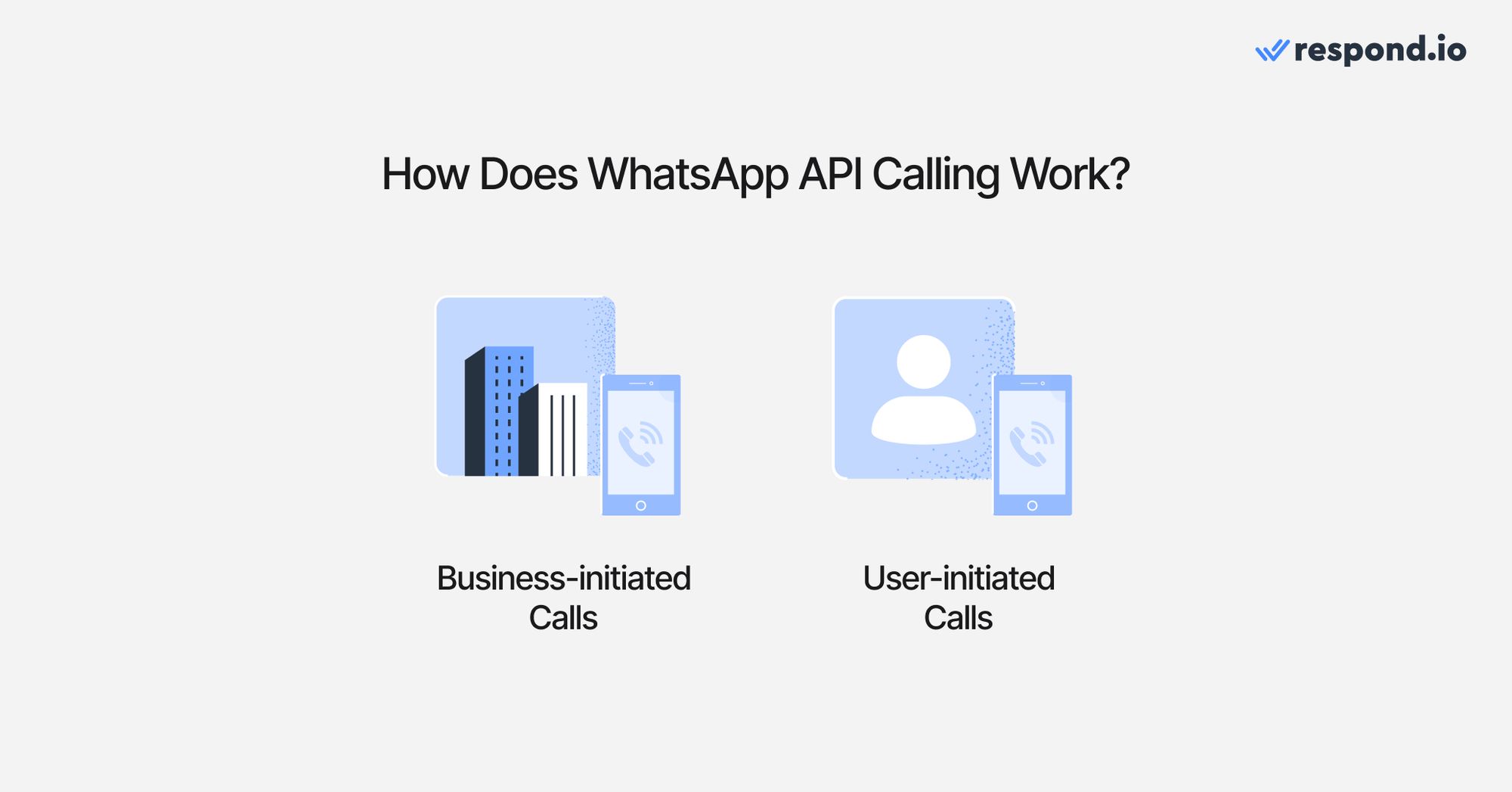
So, how can businesses and contacts call each other?
You’ll need to send a permission request when an existing Marketing, Utility, Authentication, Service, or Free Entry Point conversation is open.
A business can send a maximum of 1 permission request in 24 hours and two permission requests in seven days. This limit resets when a connected call takes place between the business and the contact. When a contact grants permission, you need to call the user within 72 hours. Here’s an example:
Day 1 (Monday): The business sends the first permission request at 10:00 AM.
Day 2 (Tuesday): The business wants to send another permission request but must wait until 10:00 AM, 24 hours after the first request. The business cannot send another request until Day 8 (Monday).
Customers can initiate calls by clicking a WhatsApp deep link or call button provided by the business. Businesses can embed deep links directly on their website, apps or QR Codes to provide more entry points for user-initiated calls. Fortunately, user-initiated calls are free.
Now that you know how they work, let’s take a look at how to set up WhatsApp API Call.
Get started with WhatsApp API calls in these three easy steps.
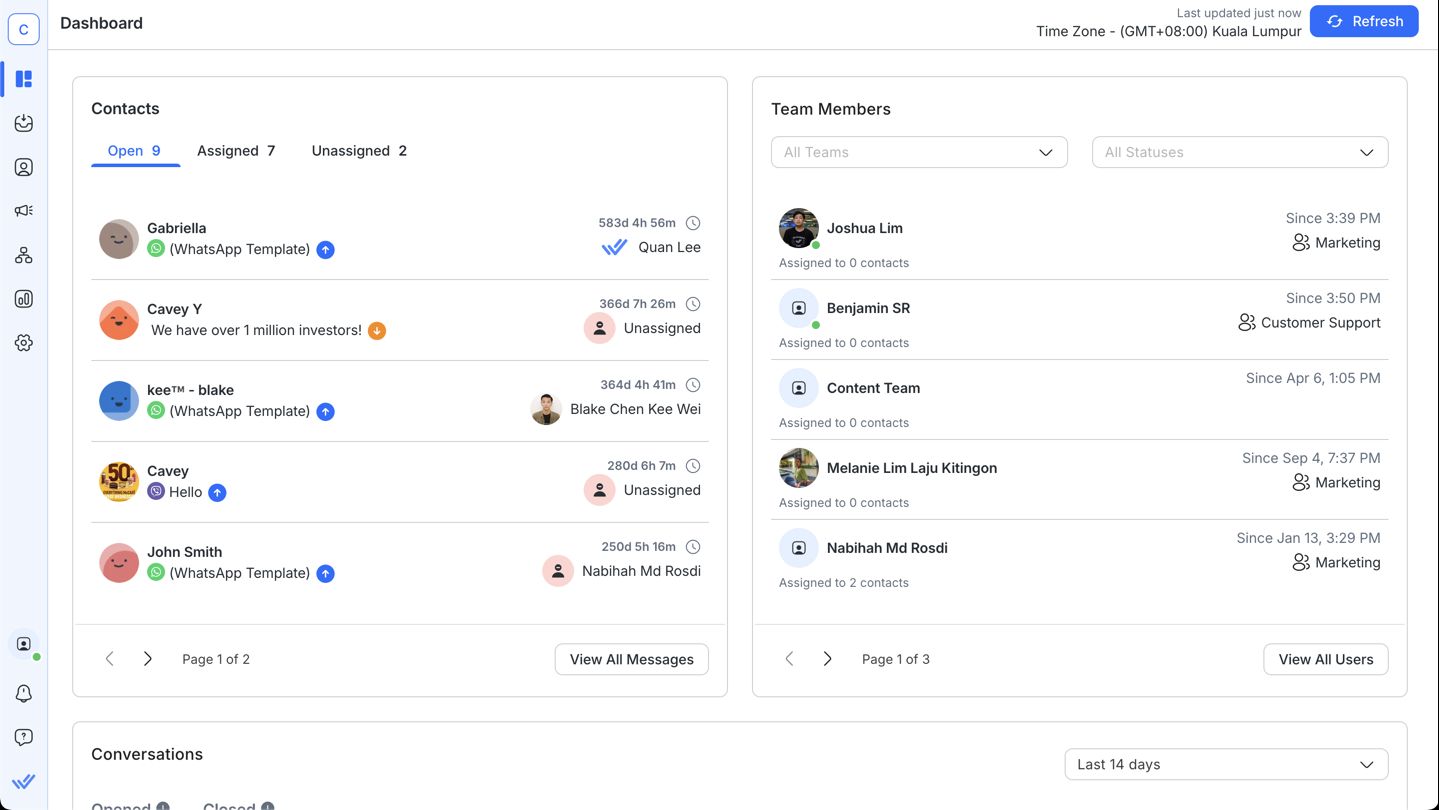
Get a WhatsApp Business API access. Sign up with a WhatsApp Business Solution Provider (BSP) like respond.io. Then, set up phone numbers and link them to the WhatsApp API account.

Access the settings menu within your WhatsApp Business API dashboard. After that, toggle the voice calling feature on and customize permissions as required.
Send a permission request to your contacts. Once they accept your request, you can call them within the 72-hour call window.
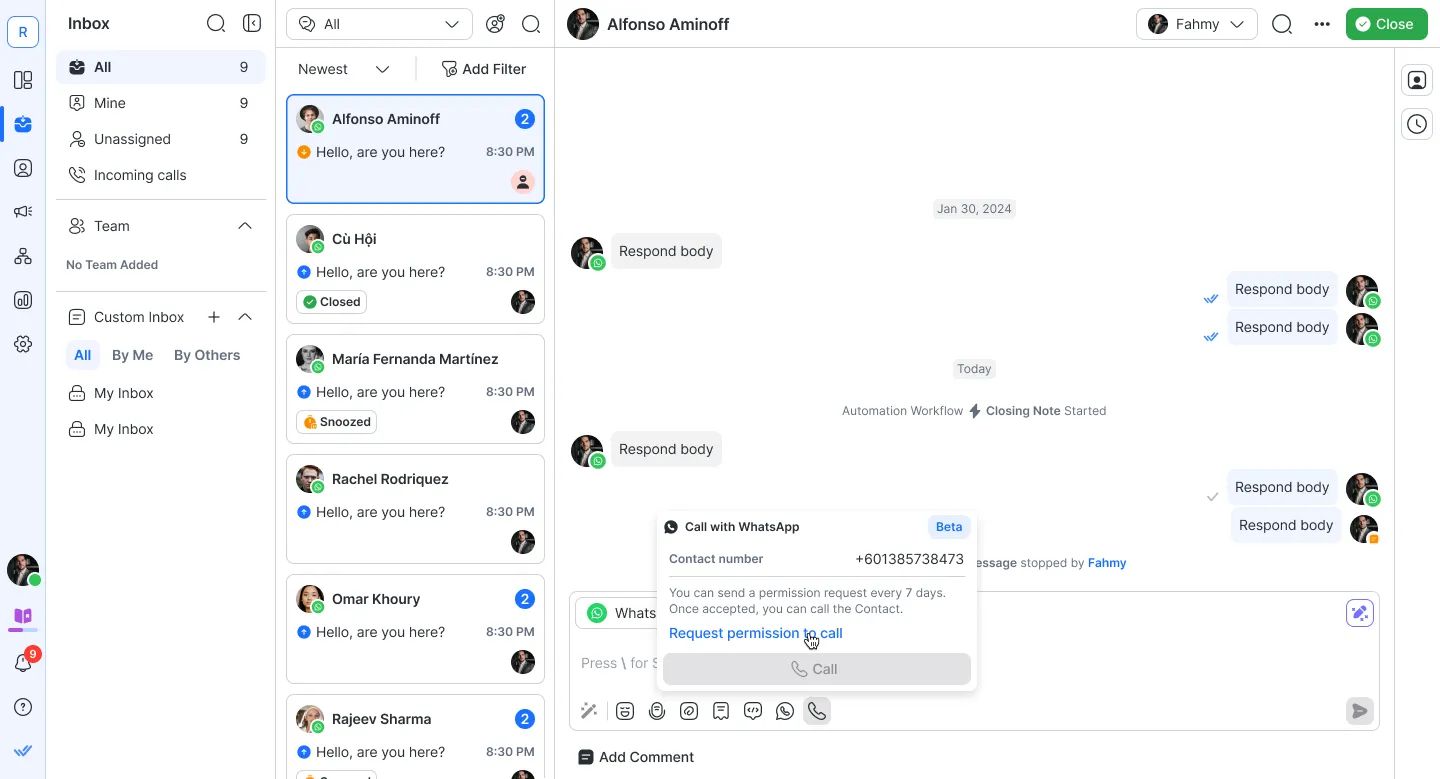
Now that you’ve set up WhatsApp API call, what can you use it for? We’ll look at that next.
There are three broad use cases for WhatsApp API Call - sales, marketing and support. As mentioned earlier, calls are better for complex explanations or urgent situations.
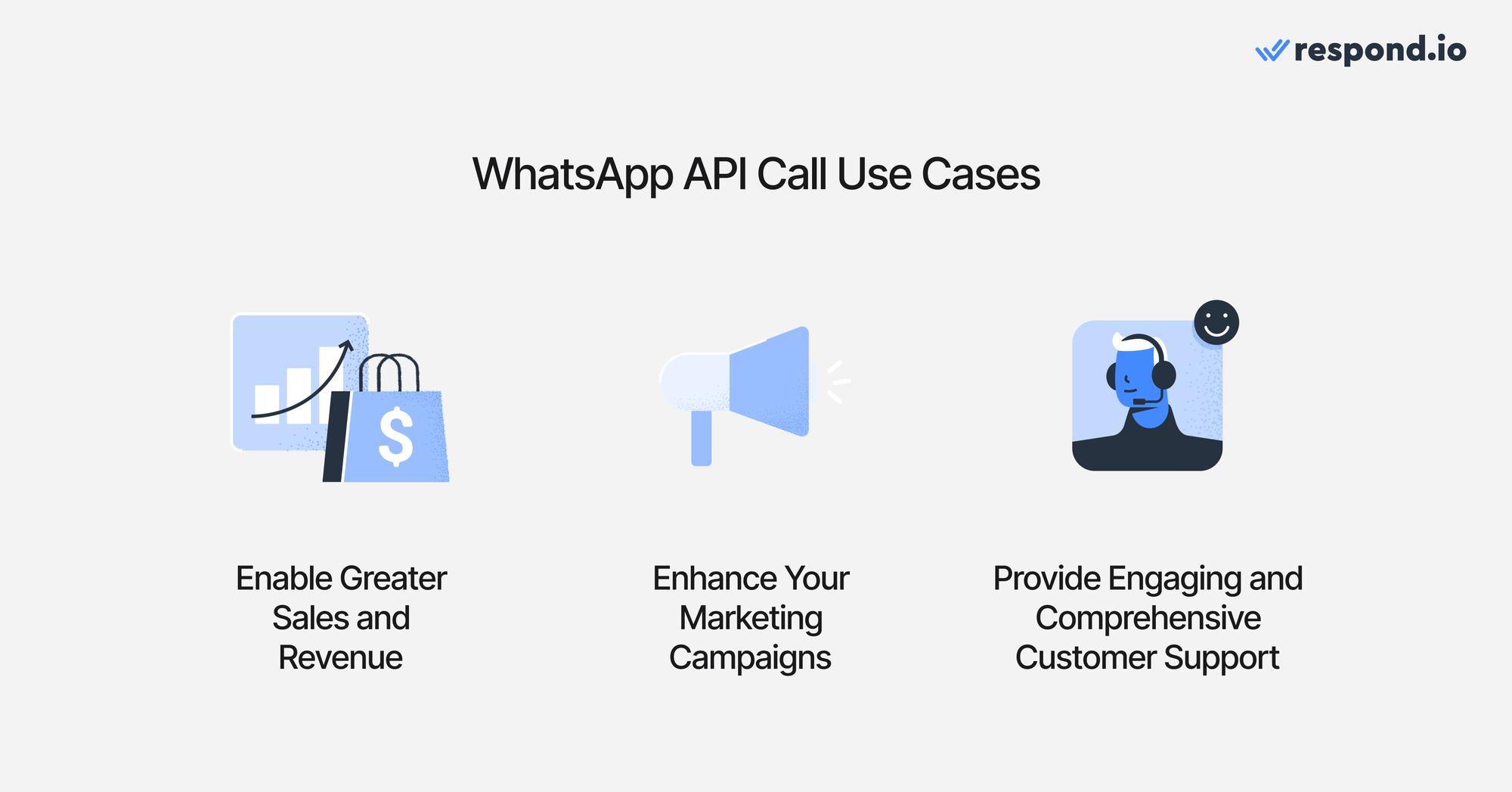
Let’s see how agents can use WhatsApp API Call for their daily tasks.
Sales agents can use WhatsApp API Calls to follow up with leads immediately after receiving an inquiry, ensuring prospects stay engaged and reducing the chances of losing them to competitors.
For example, an agent might call a potential customer to clarify questions about a product or service, guiding them through the purchase process. Personalized sales pitches delivered over a call allow agents to better address specific needs, making it easier to close deals.
Additionally, voice calls can be used to upsell or cross-sell products during follow-ups, creating opportunities to boost revenue.
Marketing teams can integrate WhatsApp API Calls into their campaigns to connect directly with high-value leads or VIP customers. For example, after running a promotional campaign, agents can call select participants to provide exclusive offers or detailed explanations of the promotion.
This direct approach creates an opportunity to improve conversion rates or customer retention.
Support agents can use WhatsApp API Calls to resolve complex issues faster and more effectively than text-based communication. For example, when a customer has trouble setting up a product, an agent can guide them step-by-step over a call, ensuring clarity and understanding.
Furthermore, calls add a human touch that is often lost in text. It assures customers that they are valued and that their issues are being resolved promptly.
Respond.io is one of the few WhatsApp Business Solution Providers with access to WhatsApp calls, as well as Messenger calls and Telnyx. To experience instant conversations and faster responses via WhatsApp calls, sign up for a respond.io account.
Turn conversations into customers with respond.io's official WhatsApp API ✨
Manage WhatsApp calls and chats in one place!
Yes, a call permission request can only be sent when an existing marketing, utility, authentication, service, or free entry point conversation is open.
Yes, WhatsApp API Calls allow you to reach customers globally.
Currently, the WhatsApp API supports voice calls only. Video call capabilities may be introduced in the future.
Yes. While on a call, businesses can still share multimedia content via the chat interface for better communication.
The API does not natively support call recording. However, businesses can use third-party tools integrated with their CRM to enable this feature. If you want to record calls, ensure that you notify customers and get their permission first.
Provide a clickable deep link or call button that customers can use to initiate a call directly from their WhatsApp App.
If a contact calls you but you don’t pick it up, you will need to send another business-initiated call request.
If a call is dropped or involuntarily disconnected, it will not count towards an approved call permission and the business can try to call again.
If you want to learn more about WhatsApp API and WhatsApp Business Calling API, then check out these articles:
Benjamin Steve Richard joined respond.io as a Content Writer in 2023. Holding a Bachelor of Laws degree from the University of London, Benjamin provides invaluable resources on messaging apps for businesses to help them leverage customer conversations successfully.

Businesses can't send WhatsApp messages after 24 hours unless they use WhatsApp Message Template. Learn how to format and send template messages plus examples.